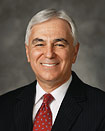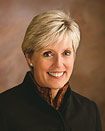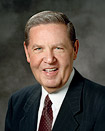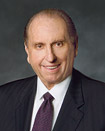Gospel Learning and Teaching, by David M. McConkie
First Counselor in the Sunday School General Presidency
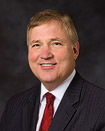
After everyone else in my house had gone to bed last night, I remained awake, looking through picture albums. I went to look for one picture, but was sucked into the albums containing pictures from my days as a full-time missionary. As I reviewed Brother McConkie's talk on learning and teaching, I reflected on the lessons I learned as a missionary and found direct correlation between what he outlined and what I tried to do.
When I served as a missionary, I tried to be a super missionary (as the picture below attests to).
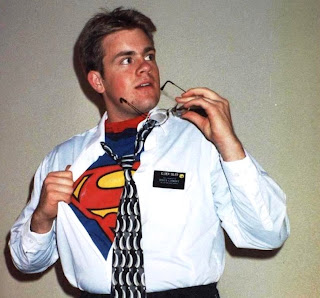
What qualifies individuals to be super missionaries?
When we think of missionaries, we often consider them as strictly teachers, and rightly so. The scripture that was on the plaque that hung on my meetinghouse's wall while I was away was D&C 31:3-5, which says, in part:
Lift up your heart and rejoice, for the hour of your mission is come; and your tongue shall be loosed, and you shall declare glad tidings of great joy unto this generation. You shall declare. . . you shall begin to preach. . . yea, to reap in the field which is white already to be burned. Therefore, thrust in your sickle. . .
While there is much teaching in missionary service, it is important to also remember the counsel, "Seek not to declare my word, but first seek to obtain my word" (D&C 11:21).
Brother McConkie put it this way:
I am not going to talk about the “how” of teaching but rather about the “how” of learning. There can be a significant difference between what a teacher says and what those in the class hear or learn. . .
Successful gospel teachers love the gospel. They are excited about it. . . To teach the gospel is to share your love of the gospel. . .
Attitude is not taught; it's caught.
Brother McConkie shares four principles to develop the attitude of a successful [super] missionary or teacher. Incidentally, each of these were repeated again and again in the missionary training manuals, as well as in the and various meetings I attended:
- Immerse yourself in the scriptures.
- Apply in your life the things that you learn.
- Seek heaven's help.
- Exercise agency and act according to spiritual promptings.
While my missionary service was a nice application for me to personally understand and apply Brother McConkie's counsel, it's important to remember that this doesn't just apply to those in full-time church service: the same principles that create super missionaries create super members (or super servants, if you prefer).
As I looked through page after page of pictures from my mission, I relived many memories. Among the pictures of missionaries acting silly (e.g. dressing as Superman), were more meaningful pictures of missionary work, loving service, and smiling converts.
Teaching alone cannot produce meaningful results in the mission field, the classroom, or the home; it takes gospel learning and teaching.
